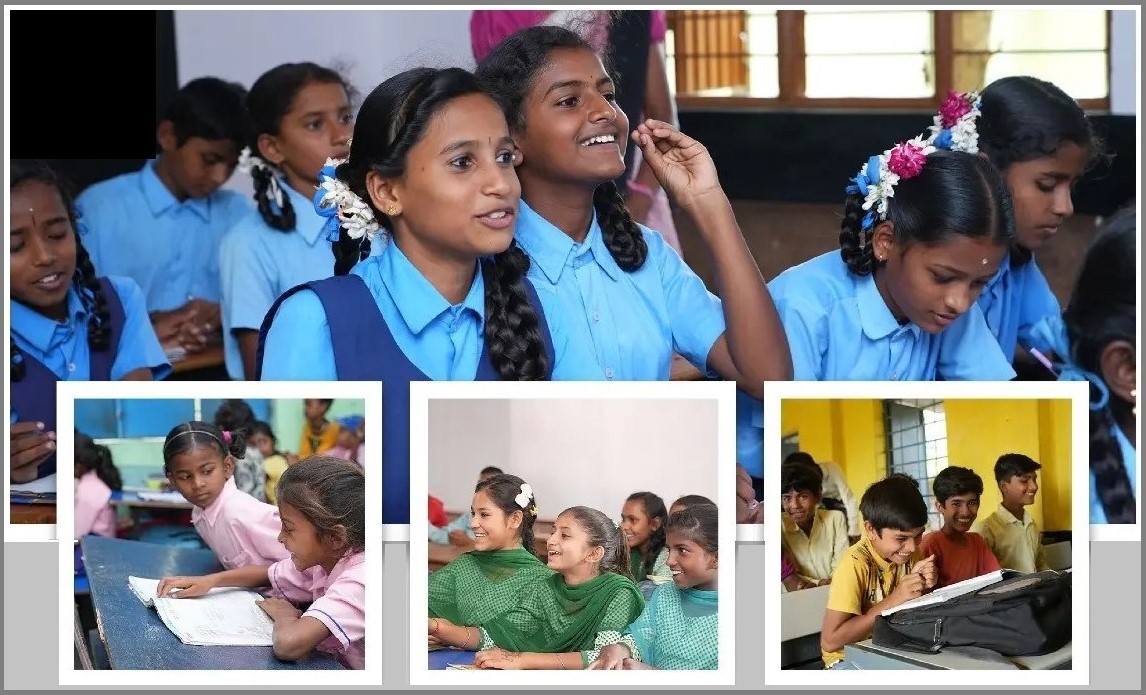
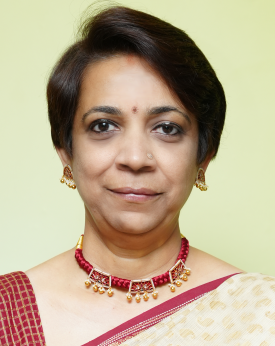 Brinda Poornapragna is the Chief Executive Officer at eVidyaloka.
Brinda Poornapragna is the Chief Executive Officer at eVidyaloka.
For over a decade, eVidyaloka has been a beacon of hope for rural students across India, leveraging technology and a volunteer-driven model to make quality education accessible. Since its inception in 2011, the initiative has expanded across 16 States and 90 districts, including 47 Aspirational Districts, impacting more than two lakh children. Through its innovative Teach Through Television programme, eVidyaloka has reached over 300 districts, ensuring learning transcends geographical barriers. This transformation has been made possible through the support of 80+ funding partners, 110+ volunteering partners, and 60+ programme partners, along with a dedicated network of 70,000 registered volunteers who have collectively delivered over 8.5 million child learning hours.
Technology-Driven Education: Building the Future
Many students in rural government schools face challenges related to limited resources, connectivity and lack of digital infrastructure. To overcome this, we at eVidyaloka employ the Digital Classroom programme, a multi-channel learning approach, where we deliver foundational subjects such as Science, Maths and English through virtual classrooms and television broadcasts as an after-school intervention. This ensures that learning remains uninterrupted, regardless of the resources available to students.
In an era where digital transformation is reshaping industries, we are ensuring that education evolves to meet modern needs. By integrating artificial intelligence, culturally relevant resources, and interactive teaching methods, we are not just addressing access issues but also enhancing the quality of learning in remote areas.
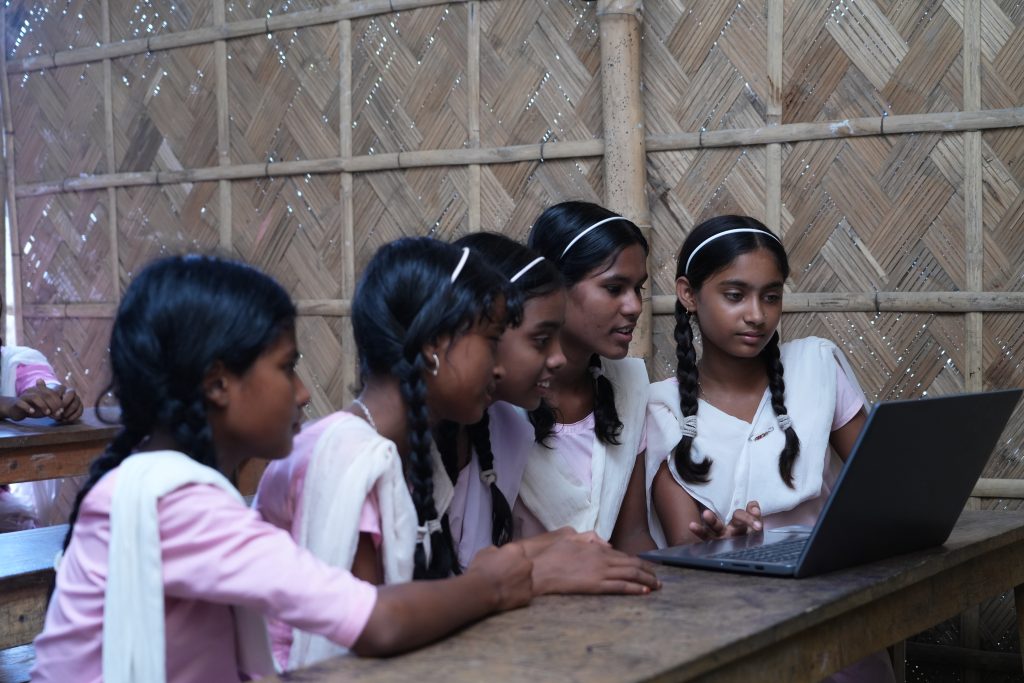 One of our most impactful innovations is Jupiter, a proprietary multi-stakeholder platform that streamlines volunteer management, student progress tracking, and curriculum delivery. The key components of Jupiter are now evolving into Sunbird Serve, an open-source, Digital Public Good, that can facilitate the adoption of the platform for seamless volunteer-student
One of our most impactful innovations is Jupiter, a proprietary multi-stakeholder platform that streamlines volunteer management, student progress tracking, and curriculum delivery. The key components of Jupiter are now evolving into Sunbird Serve, an open-source, Digital Public Good, that can facilitate the adoption of the platform for seamless volunteer-student 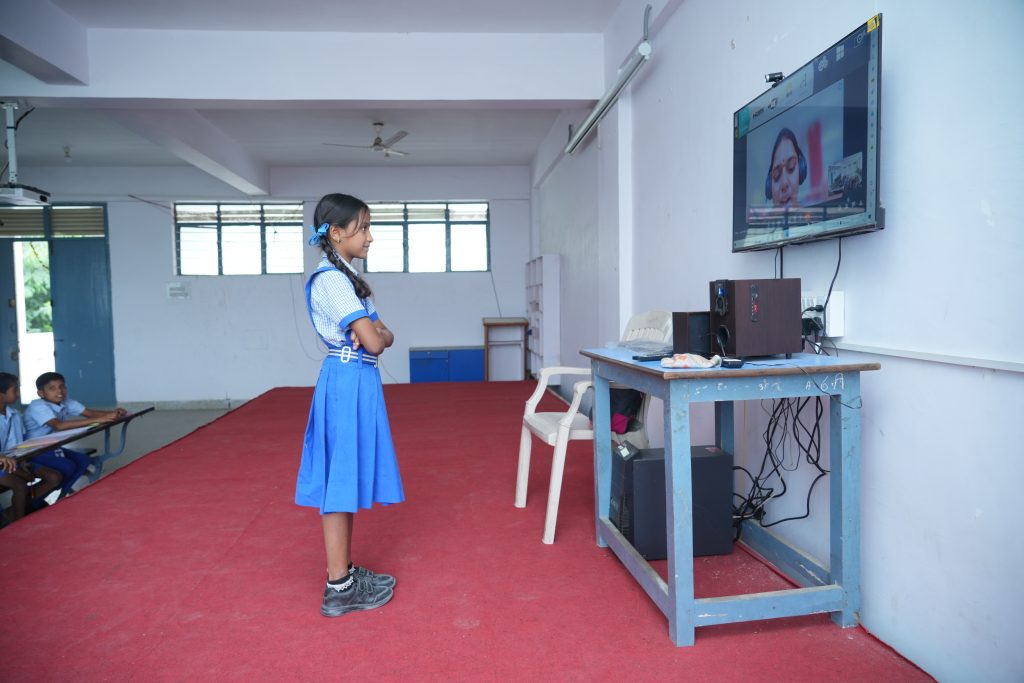 interactions, making education more scalable with seamless deployment capabilities.
interactions, making education more scalable with seamless deployment capabilities.
The ability to deliver education remotely has broadened learning opportunities for thousands of students who otherwise have limited access to quality resources. Schools in underserved areas now benefit from experienced professionals and educators across the world, helping bridge the knowledge divide between rural and urban education.
In an era where digital transformation is reshaping industries, we are ensuring that education evolves to meet modern needs. By integrating artificial intelligence, culturally relevant resources, and interactive teaching methods, we are not just addressing access issues but also enhancing the quality of learning in remote areas.
At the core of our impact is our strong volunteer network. More than 70,000 volunteers from 40+ countries actively contribute their time and expertise, teaching in virtual classrooms and creating engaging educational content. Many of these volunteers come from leading global corporations, bringing industry knowledge into classrooms and mentoring students in critical thinking, leadership, and problem-solving. Beyond teaching, volunteers also help in career guidance, soft skills development, and motivation. Their involvement bridges the aspiration gap between rural students and professionals, exposing children to new career possibilities and future opportunities.
Empowering Rural India Through AI and STEM Education
With the future of work increasingly reliant on automation, AI, and digital literacy, we ensure rural students are equipped with future-ready skills through the following:
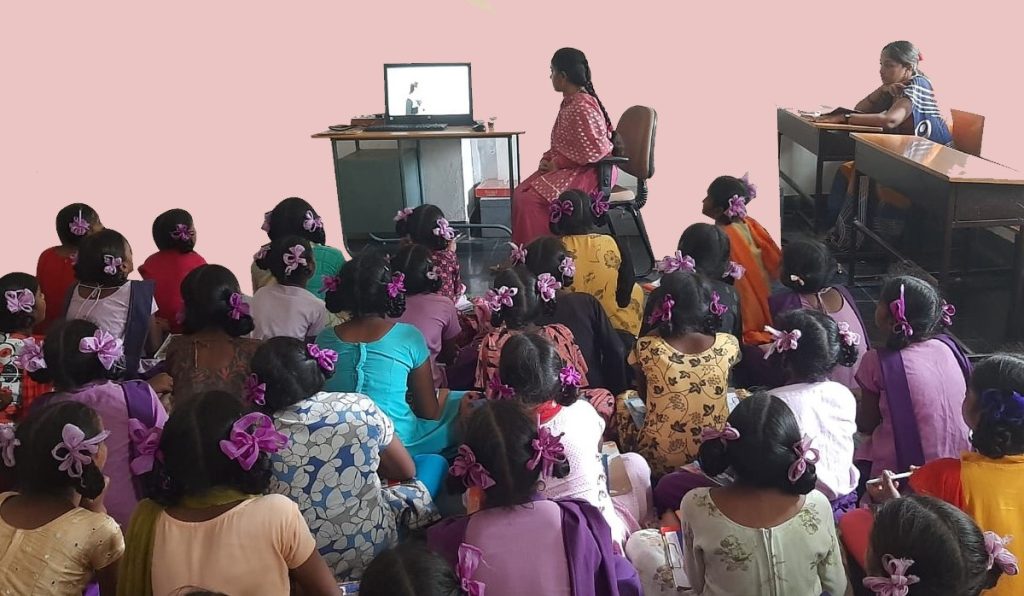 EmpowerEd promotes digital literacy, coding, and AI education, particularly encouraging young girls to pursue careers in technology.
EmpowerEd promotes digital literacy, coding, and AI education, particularly encouraging young girls to pursue careers in technology.
BRAIN (Build Rural Artificial Intelligence Network) introduces students to AI-driven problem-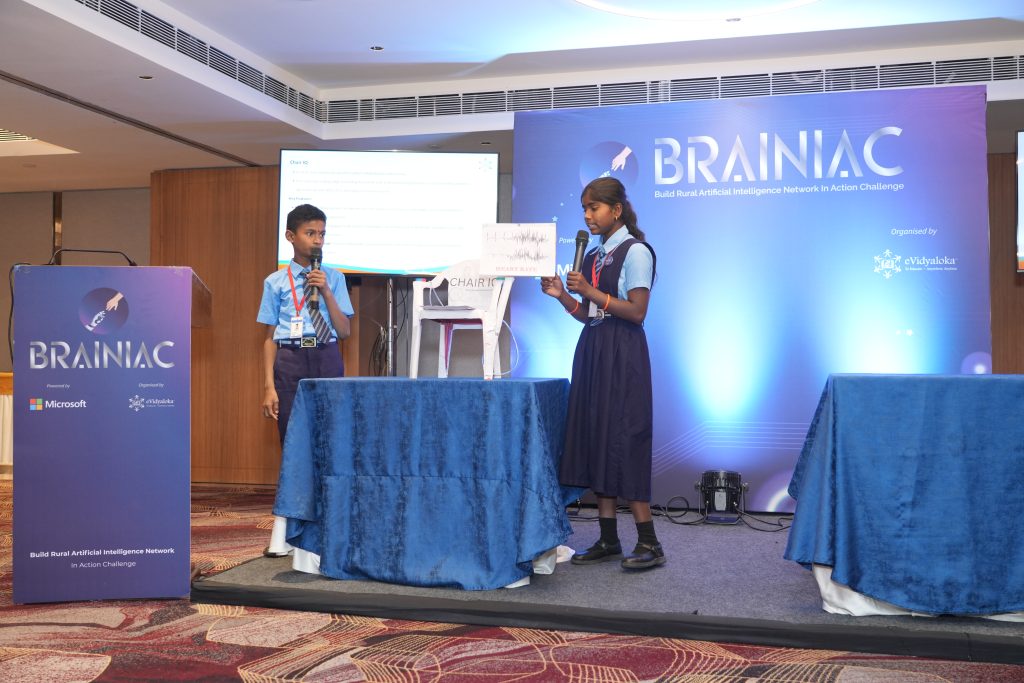 solving, allowing them to create technology-based solutions for local challenges. BRAINIAC, supported by Microsoft, enables students to apply AI concepts to real-world scenarios, inspiring the next generation of innovators.
solving, allowing them to create technology-based solutions for local challenges. BRAINIAC, supported by Microsoft, enables students to apply AI concepts to real-world scenarios, inspiring the next generation of innovators.
One of our standout success stories from this 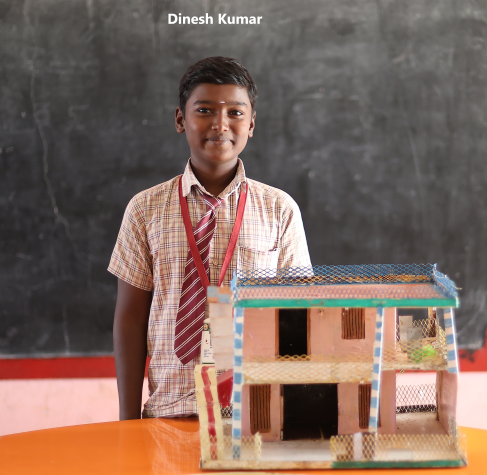 initiative comes from Thiruvannamalai, Tamil Nadu, where Dinesh Kumar, a student whose own sister suffered a fatal accident while playing at a construction site, developed an AI-powered sensor gate to improve safety at construction sites. His innovation is now being considered for practical implementation, showcasing how digital education can drive real-world change.
initiative comes from Thiruvannamalai, Tamil Nadu, where Dinesh Kumar, a student whose own sister suffered a fatal accident while playing at a construction site, developed an AI-powered sensor gate to improve safety at construction sites. His innovation is now being considered for practical implementation, showcasing how digital education can drive real-world change.
By providing hands-on experiences in AI, students are not just consumers of technology but creators of innovative solutions that have the potential to solve pressing community challenges.
A National Movement Fuelled by Volunteers
At the core of our impact is our strong volunteer network. More than 70,000 volunteers from 40+ countries actively contribute their time and expertise, teaching in virtual classrooms and creating engaging educational content. Many of these volunteers come from leading global corporations, bringing industry knowledge into classrooms and mentoring students in critical thinking, leadership, and problem-solving. Beyond teaching, volunteers also help in career guidance, soft skills development, and motivation. Their involvement bridges the aspiration gap between rural students and professionals, exposing children to new career possibilities and future opportunities.
Global Reach: International Volunteers Making a Local Impact
The flexibility of online volunteering has allowed professionals, retirees, and subject matter experts from across the world to contribute their knowledge without geographical constraints. International volunteers play a crucial role in helping students develop global perspectives, improve communication skills, and gain exposure to diverse teaching methodologies.
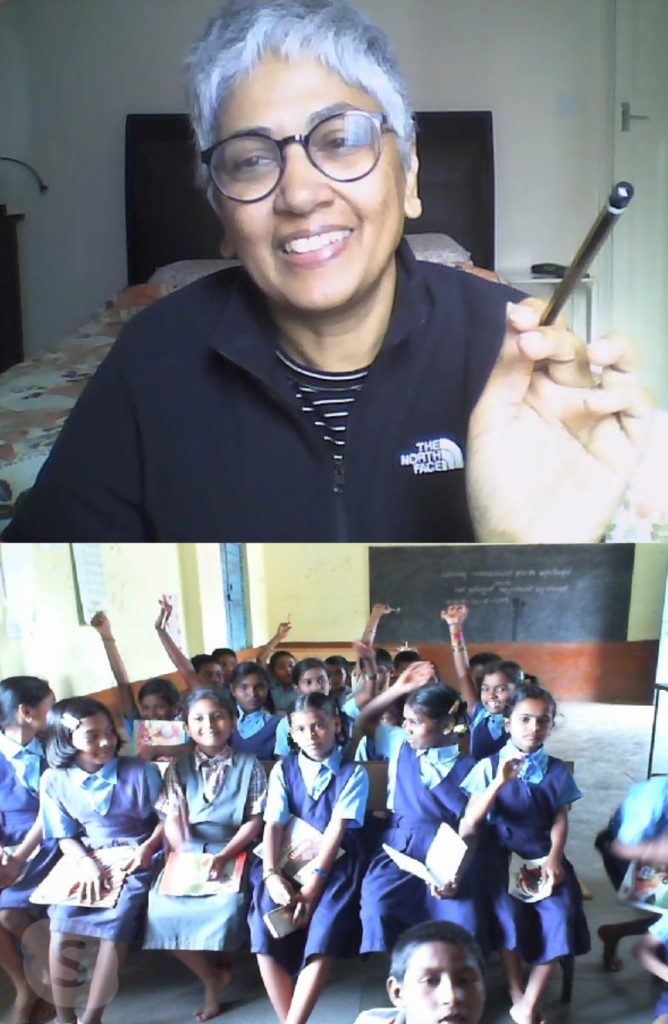 For instance, Geetha Mukundan, a banking and finance professional from London, has been volunteering with us for nearly eight years, teaching children in rural Dharwad, Karnataka. With no formal teaching background, she approaches every class with empathy, energy, and a belief that connection matters more than perfection. Over the years, she has supported students with special needs, including one child with a speech disability who now attends every class and learns through gestures and care. Her experience reflects how volunteer teaching is not just about delivering lessons, it is about listening, encouraging, and creating space for every child to be seen and heard.
For instance, Geetha Mukundan, a banking and finance professional from London, has been volunteering with us for nearly eight years, teaching children in rural Dharwad, Karnataka. With no formal teaching background, she approaches every class with empathy, energy, and a belief that connection matters more than perfection. Over the years, she has supported students with special needs, including one child with a speech disability who now attends every class and learns through gestures and care. Her experience reflects how volunteer teaching is not just about delivering lessons, it is about listening, encouraging, and creating space for every child to be seen and heard.
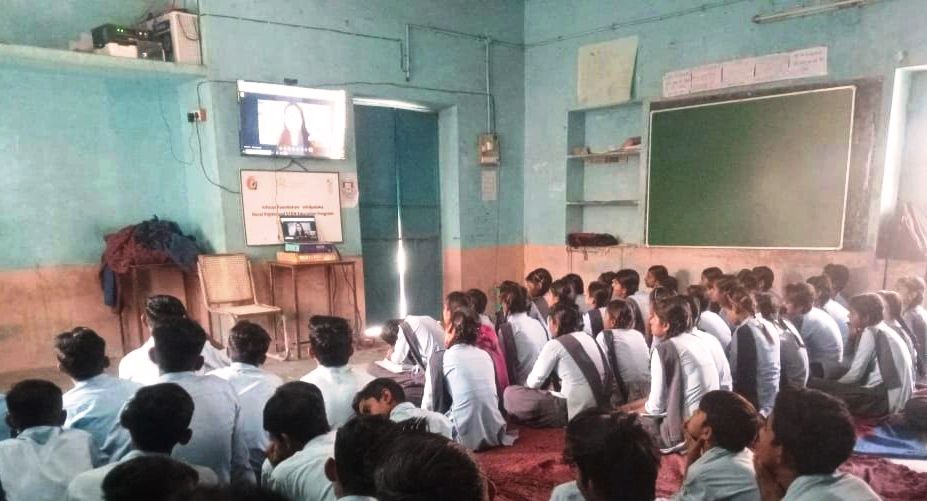 Similarly, Meenal Buch, a university faculty member in the UK, with teaching experience across India and the Middle East, brings science and language learning to life for students in rural India through our NGO. From leading hands-on experiments using everyday materials to sparking imagination through storytelling and games, Meenal has kept students engaged across multiple States. As part of the ‘Joy of Reading’ programme, she helps Grade VIII students build vocabulary and confidence through creative group storytelling, quizzes, and language games. Her classes go beyond academics, instilling values of curiosity, equality, and integrity, while opening a window to the world for students from remote classrooms.
Similarly, Meenal Buch, a university faculty member in the UK, with teaching experience across India and the Middle East, brings science and language learning to life for students in rural India through our NGO. From leading hands-on experiments using everyday materials to sparking imagination through storytelling and games, Meenal has kept students engaged across multiple States. As part of the ‘Joy of Reading’ programme, she helps Grade VIII students build vocabulary and confidence through creative group storytelling, quizzes, and language games. Her classes go beyond academics, instilling values of curiosity, equality, and integrity, while opening a window to the world for students from remote classrooms.
Our initiatives have empowered thousands of students, proving that education is the most powerful tool for transformation. Across different regions of India, young learners are overcoming barriers, discovering their potential, and applying their knowledge to solve real-world problems, all thanks to accessible digital education and dedicated volunteer mentors.
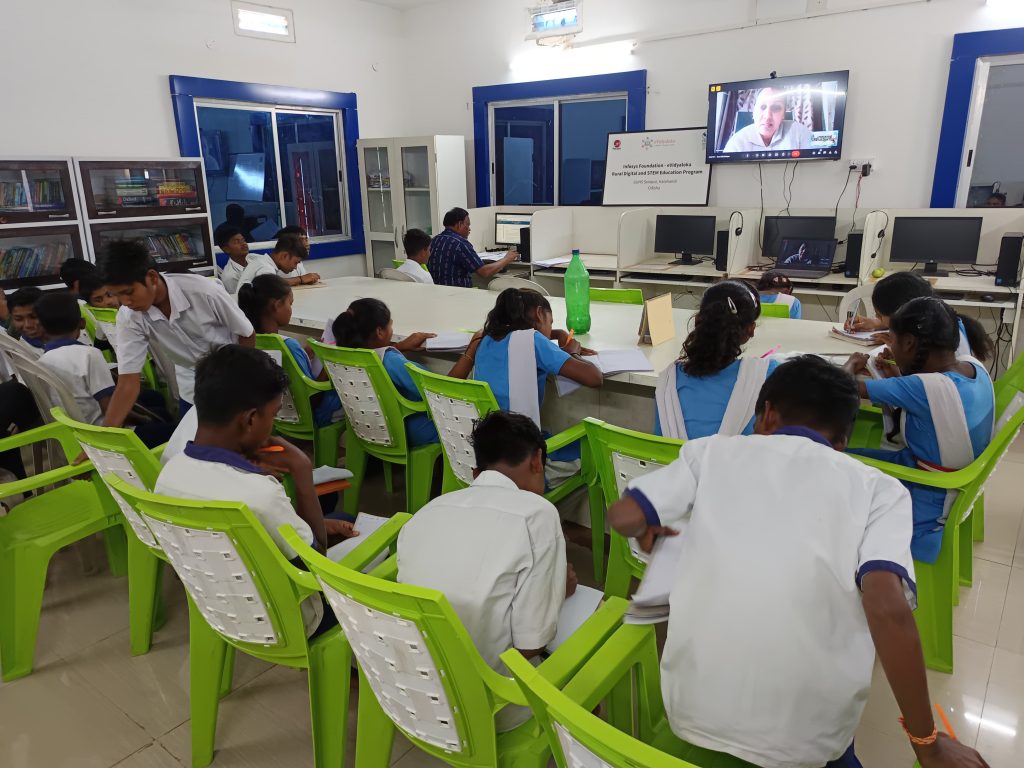 While international volunteers bring a global perspective, local volunteers deeply understand regional challenges, ensuring students receive culturally relevant guidance. Aradhana Pandapat, a volunteer teacher from Odisha, exemplifies this commitment. Using digital tools to make science engaging and accessible, she ensures that no child in her class is left behind. Her dedication to digital learning and innovative teaching methods has helped students grasp complex scientific concepts and develop a passion for STEM education. Aradhana goes beyond the curriculum, conducting extra sessions to help struggling students, earning recognition from the school’s Headmaster and the admiration of her students.
While international volunteers bring a global perspective, local volunteers deeply understand regional challenges, ensuring students receive culturally relevant guidance. Aradhana Pandapat, a volunteer teacher from Odisha, exemplifies this commitment. Using digital tools to make science engaging and accessible, she ensures that no child in her class is left behind. Her dedication to digital learning and innovative teaching methods has helped students grasp complex scientific concepts and develop a passion for STEM education. Aradhana goes beyond the curriculum, conducting extra sessions to help struggling students, earning recognition from the school’s Headmaster and the admiration of her students.
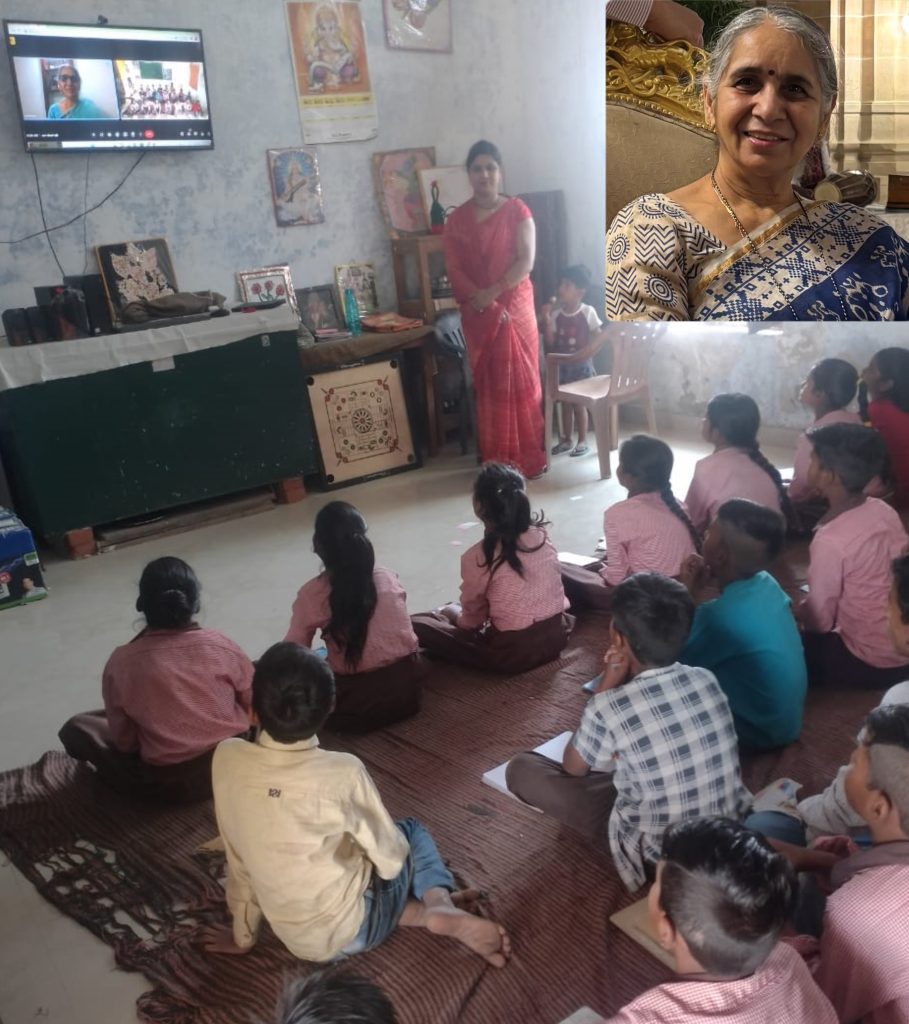 Likewise, Sunita Puri, a retired Indian Revenue Service officer from Chandigarh, has been teaching English to rural students through eVidyaloka for over two years. Drawing inspiration from her mother, a teacher in rural Punjab, Sunita brings real-life experiences from her civil service career into her virtual classroom. Her empathetic approach of encouraging students to express themselves in any language and gradually guiding them into English has made learning accessible and meaningful. From helping students rediscover education after family, Sunita’s commitment goes beyond academics as she offers mentorship, motivation, and a window to the world.
Likewise, Sunita Puri, a retired Indian Revenue Service officer from Chandigarh, has been teaching English to rural students through eVidyaloka for over two years. Drawing inspiration from her mother, a teacher in rural Punjab, Sunita brings real-life experiences from her civil service career into her virtual classroom. Her empathetic approach of encouraging students to express themselves in any language and gradually guiding them into English has made learning accessible and meaningful. From helping students rediscover education after family, Sunita’s commitment goes beyond academics as she offers mentorship, motivation, and a window to the world.
While these are a few examples, this collaboration between local and international volunteers has created a well-rounded learning experience for our rural students.
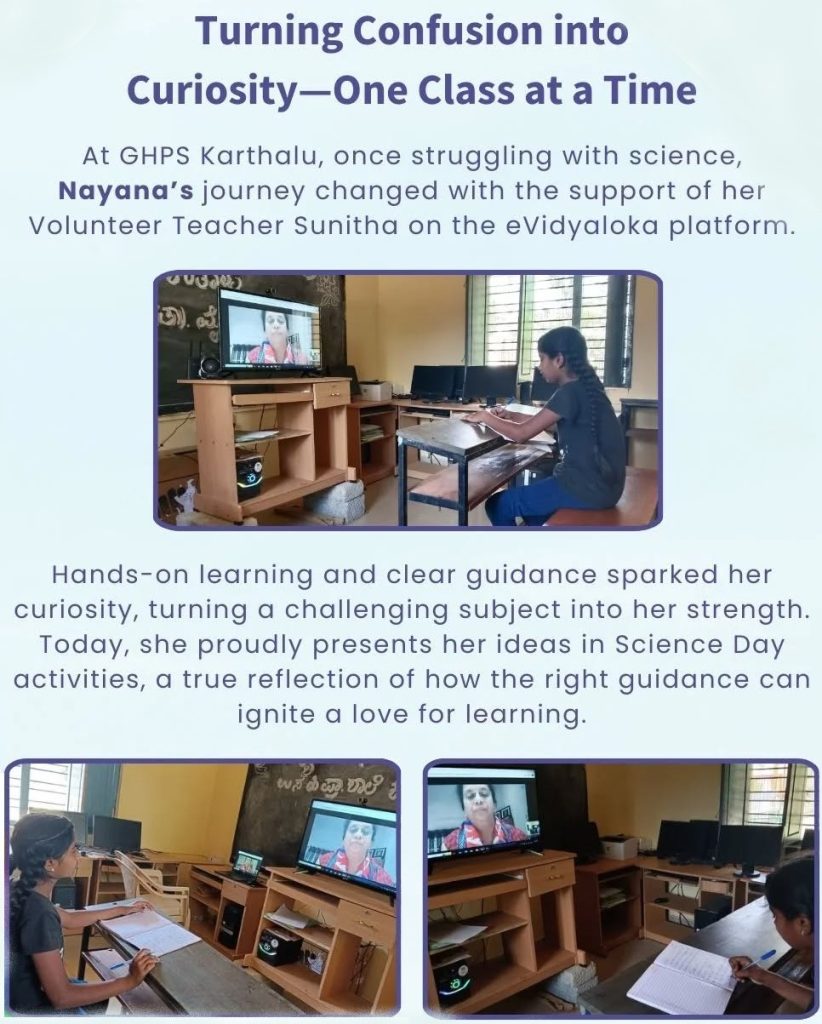
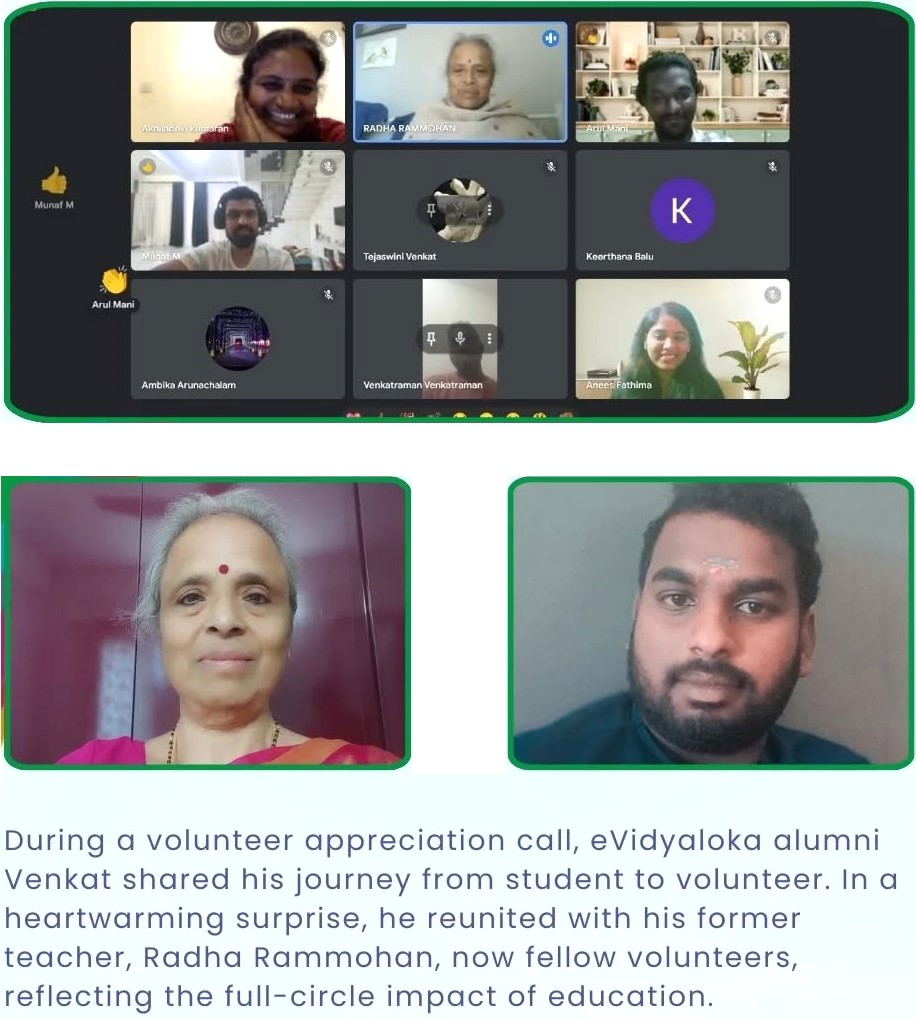
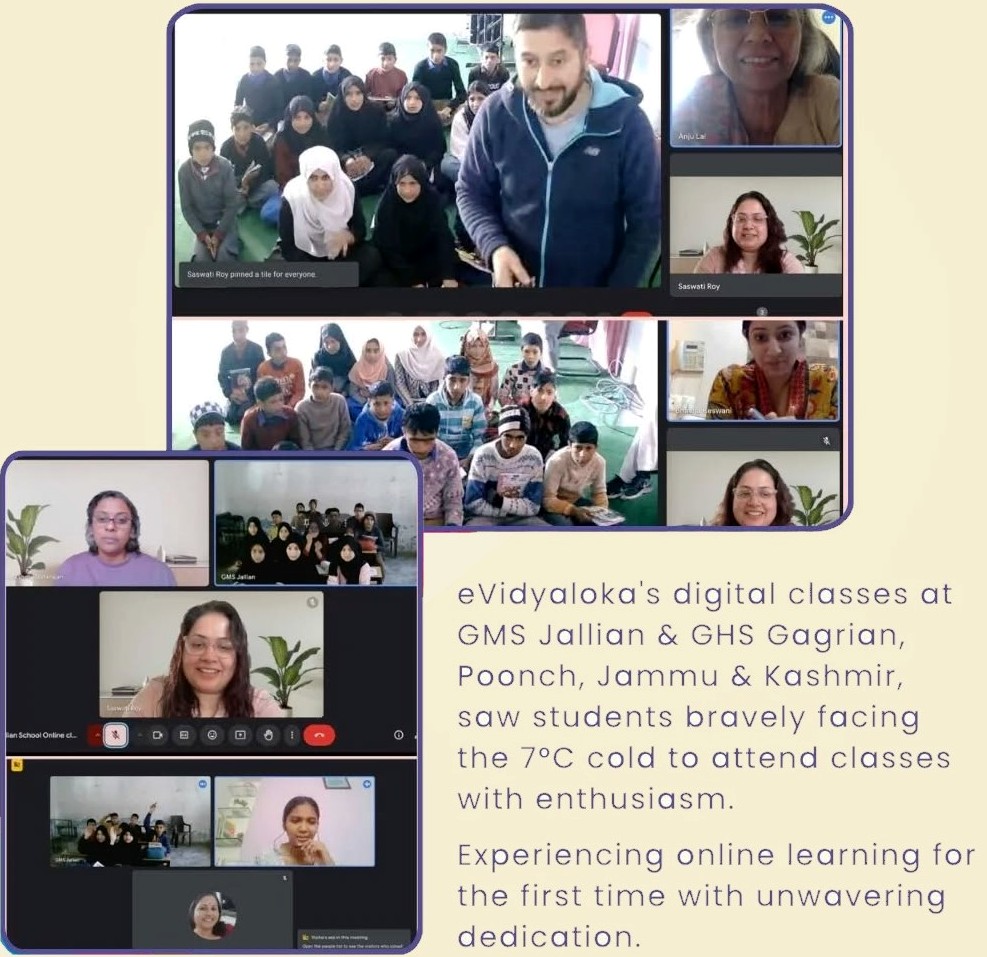
Transforming Rural Learning: Real Stories, Real Impact
Our initiatives have empowered thousands of students, proving that education is the most powerful tool for transformation. Across different regions of India, young learners are overcoming barriers, discovering their potential, and applying their knowledge to solve real-world problems, all thanks to accessible digital education and dedicated volunteer mentors.
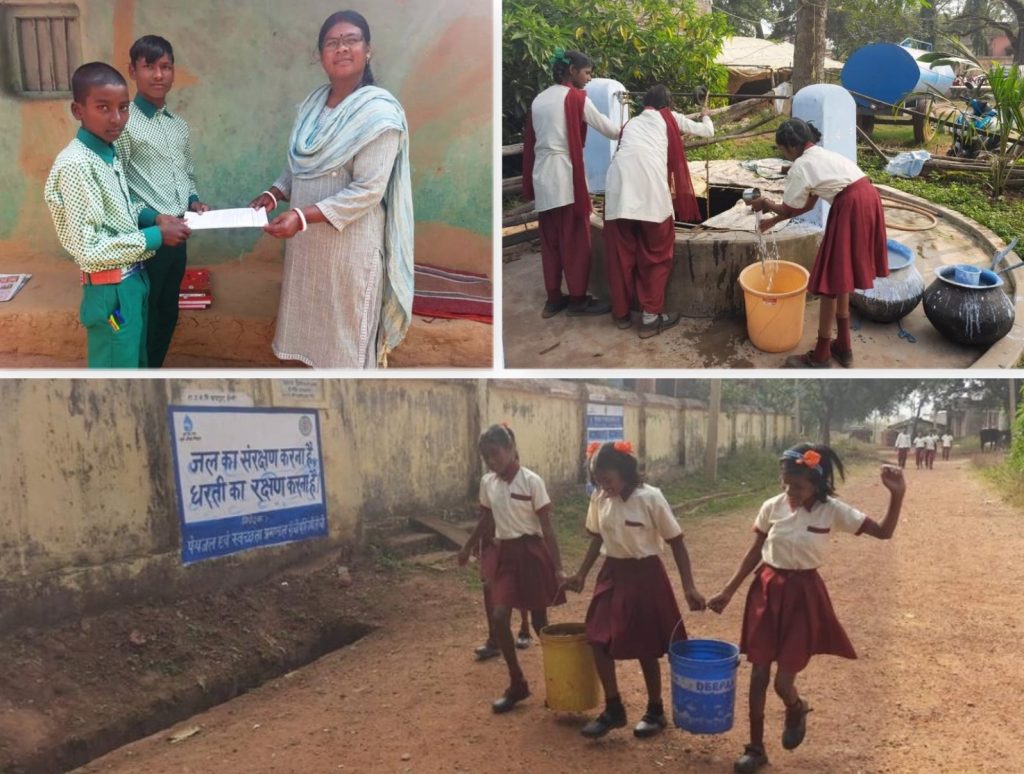 In Chachgura, Jharkhand, two students from a government school who participated in our National Students Innovation Challenge (NSIC) decided to act upon a severe water crisis in their village. Through research and collaboration with local authorities, they successfully secured a borewell installation, ensuring clean water for their school and community. Their journey highlights how education can empower students to identify problems, navigate bureaucratic processes, and implement tangible solutions.
In Chachgura, Jharkhand, two students from a government school who participated in our National Students Innovation Challenge (NSIC) decided to act upon a severe water crisis in their village. Through research and collaboration with local authorities, they successfully secured a borewell installation, ensuring clean water for their school and community. Their journey highlights how education can empower students to identify problems, navigate bureaucratic processes, and implement tangible solutions.
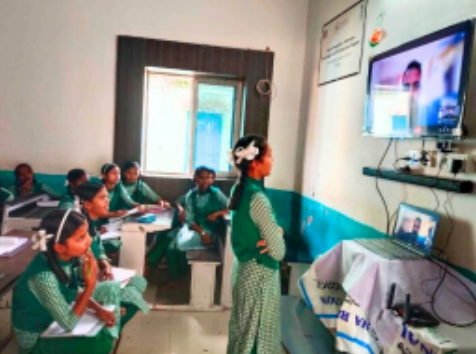 In Odisha’s Koraput district, Shreya Tanti, a Class IX student, dreams of becoming a doctor but lacks access to the kind of learning that could support that ambition. Her school was introduced to a world of interactive and engaging learning through our Digital Classroom Programme. She was then connected to volunteer teachers across India, including a doctor-turned-educator who became her mentor. With interactive lessons and constant encouragement, Shreya’s confidence grew, and so did her grasp of Science and Math. Today, Shreya says, “I once thought becoming a doctor was just a distant dream. Now, I know I can achieve it.”
In Odisha’s Koraput district, Shreya Tanti, a Class IX student, dreams of becoming a doctor but lacks access to the kind of learning that could support that ambition. Her school was introduced to a world of interactive and engaging learning through our Digital Classroom Programme. She was then connected to volunteer teachers across India, including a doctor-turned-educator who became her mentor. With interactive lessons and constant encouragement, Shreya’s confidence grew, and so did her grasp of Science and Math. Today, Shreya says, “I once thought becoming a doctor was just a distant dream. Now, I know I can achieve it.”
In Rajasthan, Rekha Kumari, once hesitant about science, found herself struggling to grasp fundamental concepts. However, her volunteer teacher, Ms. Bhawna, introduced her to an engaging, curiosity-driven approach to learning. Rekha’s transformation from uncertainty to enthusiasm reflects how the right mentorship and digital tools can unlock a student’s potential, turning education into an empowering experience.
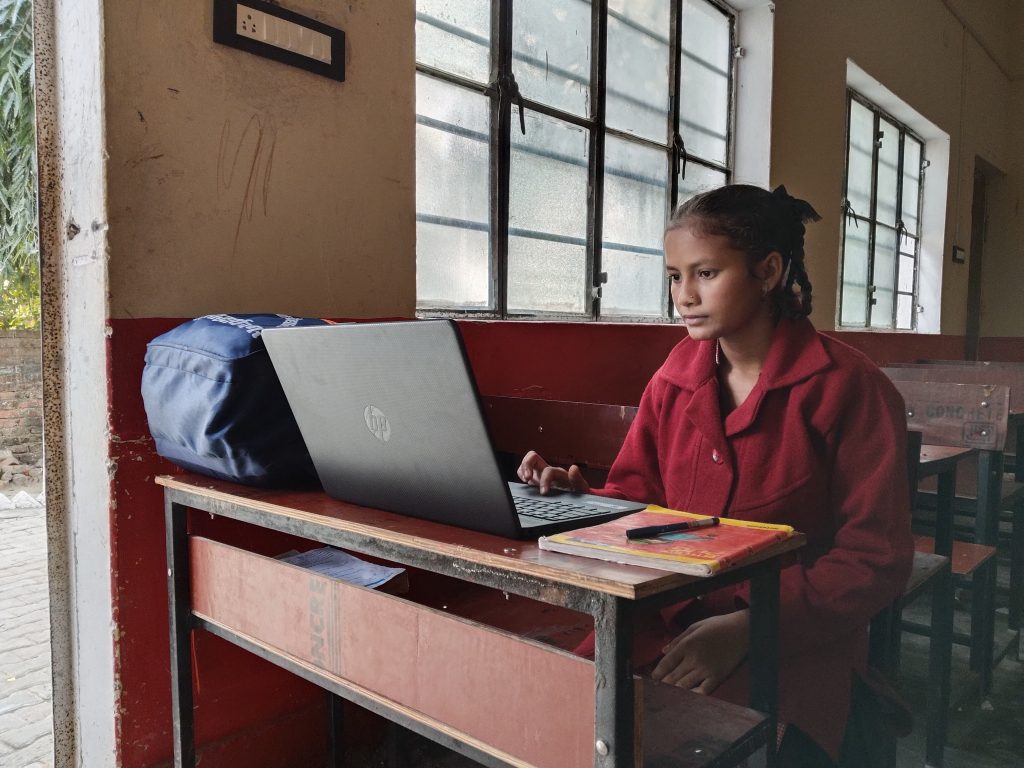 Meanwhile, in Alga village of Siddharthnagar, Uttar Pradesh, 13-year-old Neetu Yadav took her first hesitant steps into the world of technology through our EmpowerEd initiative. Computers once felt intimidating; even the word “cursor” was foreign to her. With patient support from her volunteer teacher and class assistant, Neetu slowly built her confidence, mastering basic tools like MS Paint and Word. Today, she navigates digital tasks with ease and even mentors her classmates. Her journey reflects how digital literacy can transform hesitation into confidence and spark dreams in the heart of rural India.
Meanwhile, in Alga village of Siddharthnagar, Uttar Pradesh, 13-year-old Neetu Yadav took her first hesitant steps into the world of technology through our EmpowerEd initiative. Computers once felt intimidating; even the word “cursor” was foreign to her. With patient support from her volunteer teacher and class assistant, Neetu slowly built her confidence, mastering basic tools like MS Paint and Word. Today, she navigates digital tasks with ease and even mentors her classmates. Her journey reflects how digital literacy can transform hesitation into confidence and spark dreams in the heart of rural India.
These stories highlight how education, when made accessible and engaging, can empower students to solve challenges, build confidence, and create a ripple effect in their communities. By leveraging technology and mentorship, we continue to bridge the education divide, ensuring that every child, regardless of location, has the opportunity to learn, grow, and transform their future.
Our NGO, eVidyaloka, is more than just an education initiative. It is a movement that is reshaping the landscape of rural education in India. With technology, innovation, and an unwavering commitment to inclusivity, we are ensuring that every child, no matter where they are, has the opportunity to learn, grow, and succeed.
Scaling Impact: The Road Ahead
We are not stopping here. As part of our long-term vision, we are expanding in key areas to broaden our reach and deepen our impact:
- The expansion of Sunbird Serve will include more schools across India, increasing the accessibility of digital classrooms.
- Launch of an AI-powered teaching assistant designed to provide personalised learning experiences to students.
- Strengthening collaborations with corporates, government bodies, and global institutions to ensure continued support for rural education.
- Enhancing multi-lingual education initiatives, ensuring that students from different linguistic backgrounds can access learning in their mother tongue.
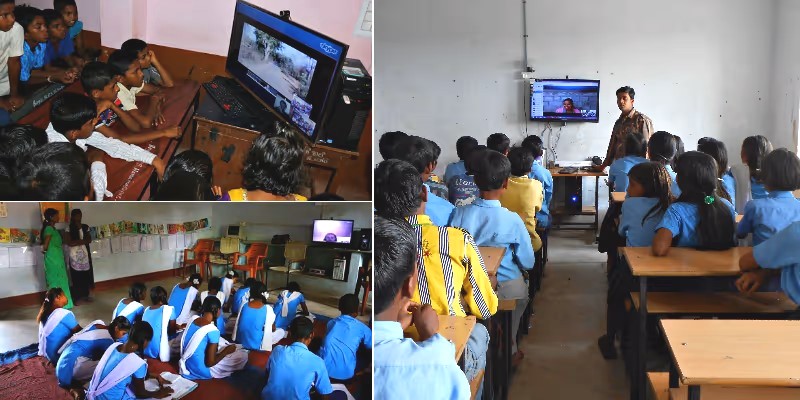
A major focus for the future is the integration of career skilling and job readiness programmes to help students transition from school to employment. By equipping students with the necessary skills and industry exposure, we aim to educate and empower students to become independent and future-ready.
A Vision for the Future
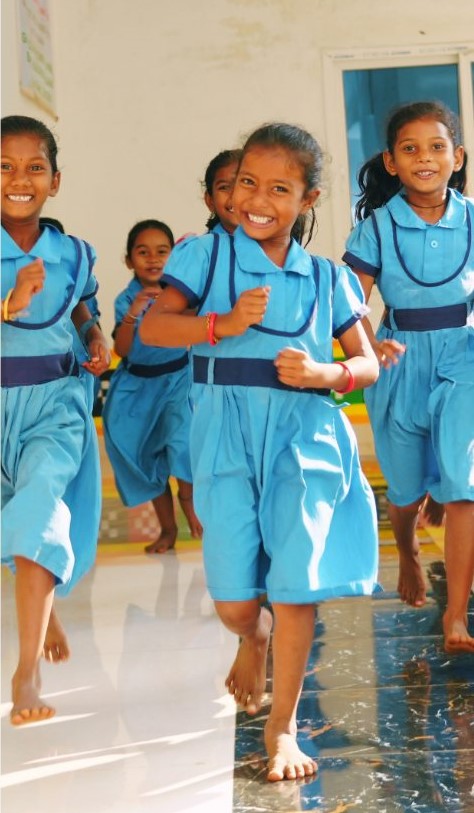
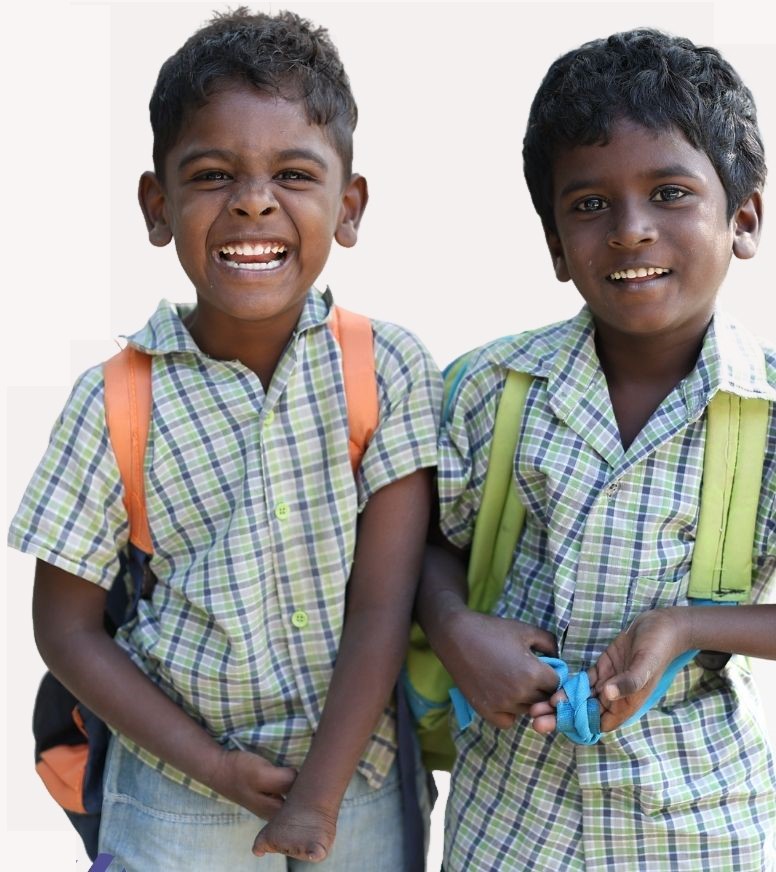 Our NGO, eVidyaloka, is more than just an education initiative. It is a movement that is reshaping the landscape of rural education in India. With technology, innovation, and an unwavering commitment to inclusivity, we are ensuring that every child, no matter where they are, has the opportunity to learn, grow, and succeed.
Our NGO, eVidyaloka, is more than just an education initiative. It is a movement that is reshaping the landscape of rural education in India. With technology, innovation, and an unwavering commitment to inclusivity, we are ensuring that every child, no matter where they are, has the opportunity to learn, grow, and succeed.
As India moves towards a more digital and knowledge-driven future, initiatives like ours will play a critical role in ensuring that no student is left behind, bridging the divide between urban and rural education, and fostering a generation of future-ready learners and leaders.

